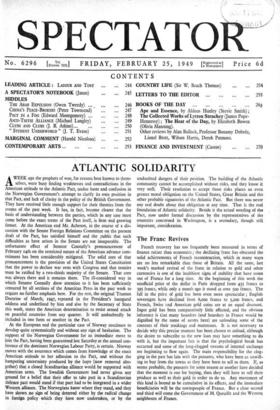The Franc Revives
French recovery has too frequently been measured in terms of finance rather than economics ; the declining franc has obscured the solid achievements of French reconstruction, which in many ways are no less remarkable than those of Britain. All the same, last week's marked revival of the franc in relation to gold and other currencies is one of the healthiest signs of stability that have come out of France for a long time. At the beginning of this week the unofficial price of the dollar in Paris dropped from 435 francs to 395 francs, while only a month ago it stood at over 50o francs. The fall in the price of gold has been even more spectacular ; English sovereigns have declined from 6,000 francs to 5,200 francs, and French, Swiss r.nd American gold coins are at an equal discount. Ingot gold has been comparatively little affected, and the obvious inference is that many hoarders (and hoarders in France would be dignified by the name of savers here) are unloading some of the contents of their stockings and mattresses. It is not necessary to decide why this precise moment has been chosen to unload, although the desire to subscribe to the new loan may have something to do with it, but the important fact is that the psychological break has occurred and some of the long-clogged streams of internal exchange are beginning to flow again. The main responsibility for the clog- ging in the past has lain with the peasants, who have been as unwill- ing to buy from the towns as they have been to sell to them. If, as seems probable, the peasants for some reason or another have decided that the moment is one for buying, then they will have to sell their produce as well as their gold in order to do so. Any movement of this kind is bound to be cumulative in its effects, and the immediate beneficiaries will be the townspeople of France. But a close second and third will come the Government of M. Queuille and the Western .neighbours of France.


































